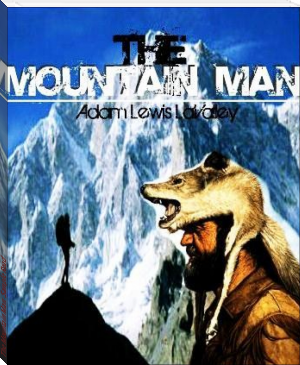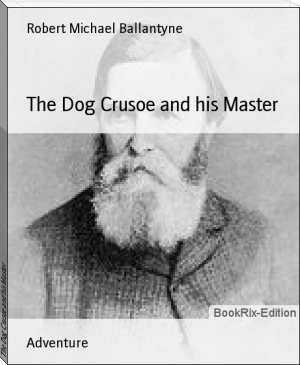The Rover of the Andes - Robert Michael Ballantyne (i have read the book txt) 📗

- Author: Robert Michael Ballantyne
Book online «The Rover of the Andes - Robert Michael Ballantyne (i have read the book txt) 📗». Author Robert Michael Ballantyne
"You'll go, I suppose?" he said to Lawrence, referring to the ball.
"Indeed I will not. I've had no invitation, and have no evening dress."
"Why, Senhor Armstrong forgets he is not now in England," said Pedro. "We require neither invitation nor evening dress in an out-o'-the-way place like this. You'll find all sorts of people there. Indeed, a few are likely to be of the class who prefer to dance with their coats off."
"No matter, I'll not go. Nothing will induce me to go," returned Lawrence, firmly--almost testily.
"Don't say that," rejoined Pedro, regarding his companion with a peculiar smile. "You may perhaps meet friends there."
"You know that I have no friends here," returned our hero, who thereupon went off to his own room to meditate over his uncomfortable feelings.
But when he had reached his room and shut his door, Pedro's reference to meeting with friends, coupled with his peculiar look, recurred to him. What could the fellow mean? What friends had he in the country except Pedro himself and Quashy and Spotted Tiger and--and--Manuela, but of course he could not refer to the last, for who ever heard of a governor inviting an unknown Indian girl to a ball! No; Pedro must have been jesting. He would _not_ go!
But the longer he thought over the matter, the more were his perplexity and curiosity increased, until at last he wavered in his firm determination not to go, and when the ball was about to begin, of which the sounds of hurrying steps and musical instruments apprised him, he changed his mind. Combing his hair slightly, he tried to brush his rough garments with his hands, arranged his necktie and flannel collar a little, dusted his long boots with a towel, washed his hands, laid aside his weapons, and went off to the hall with the intention of at least looking in at the door to see what was going on.
He met Pedro in the corridor.
"Ha! Senhor Armstrong has changed his mind?"
"Yes, I have."
Lawrence said this in the slightly defiant tone of a man who gives in with a bad grace. He was altogether "out of sorts" and unlike himself, but Pedro, like a true friend, took no notice of that.
"I'm glad you have given in, senhor," said Pedro, "for it saves me the trouble of dragging you there by force, in order that I may have the pleasure of seeing how you will look under the influence of a surprise."
"A surprise, Pedro?"
"Yes. But come; the ball is about to begin."
At the end of the corridor they encountered the English sportsman, who at the same moment chanced to meet his friend, to whom he said--
"I say, just come and--aw--have a look at the company. All free and easy, no tickets required, no dress, no--aw--there goes the governor--"
The remainder was lost in distance as the two sporting characters sauntered to the ballroom, where they stood near the door, looking on with condescending benignity, as men might for whose amusement the whole affair had been arranged.
And truly there was much to be amused at, as Lawrence and his companion, standing just within the doorway, soon found. Owing to the situation of the little town near the base of the mountains, there were men there of many nations and tongues on their way to various mines, or on business of some sort in or on the other side of the mountains--Germans, French, Italians, English, Spanish, and Portuguese. All strangers were welcomed by the hospitable governor and landlord--the latter of whom felt, no doubt, that his loss on food was more than counterbalanced by his gain on drink. Among the guests there were Gauchos of the Pampas, and the head men of a band of peons, who had just arrived with a herd of cattle. As these danced variously, in camp-dresses, top-boots, silver spurs, ponchos, and shirt sleeves, and as the ladies of the town appeared in picturesque and varied costumes with mantillas and fans, Lawrence felt as if he were witnessing a fancy dress gathering, and soon became so absorbed as to forget himself and his companion entirely.
He was aroused from his reverie by the drawling exclamation--
"Aw! indeed?"
"Yes," replied the landlord to the sportsman, "the colonel's coming. He's a jolly old man, and likes to see other people enjoyin' a bit o' fun. An' what's more, he's goin' to bring his daughter with him, and another girl--a niece, I suppose. They say they're both splendid creatures."
"Aw! indeed," languidly replied the sportsman, twisting his moustache.
It was evident that the landlord had failed to arouse his interest.
At that moment the first dance came to an end, and there was a stir at the upper end of the room, where was another door of entrance.
"It's the colonel," exclaimed the landlord, hurrying forward.
Colonel Marchbanks entered with a lady on either arm. He was a splendid old man--so tall that Lawrence could distinguish his fine bald head, with its fringe of white hair, rising high above the intervening guests.
People became silent and fell away from him, as if to have a better look at him.
"Come," said Pedro, suddenly, "I will introduce you."
There was a strange gleam in Pedro's eyes, and unwonted excitement in his manner, as he pushed his way through the crowd.
Lawrence followed in some surprise.
Suddenly he heard a sharp, strange, indescribable shout. It was the voice of Pedro, who was only a few yards in advance of him. Our hero sprang forward and beheld a sight which filled him with surprise. One of the girls who leaned on the colonel's arm was a beautiful blonde of about fifteen, with flowing golden hair and rich brown eyes. She stood as if petrified, with the brown eyes gazing intensely at Pedro, who also stood transfixed returning the gaze with compound interest.
"Mariquita!" he murmured, holding out both hands.
"Yes," said the delighted colonel, "I felt quite sure she was your child, but said nothing about--"
"Father!" burst from the girl, as, with a cry of joy, she bounded into Pedro's arms.
"Just so," continued the colonel, "I didn't like to mention my suspicions for fear of raising false hopes, and thought the surest way would be to bring them face to face. Wasn't it so, Manuela?"
Lawrence turned as if he had received an electric shock. He had been so absorbed in the scene we have just described, that he had not looked at the girl who leaned on the colonel's other arm. He now turned and beheld--not the Indian girl of his travels, but a fair-skinned, dark-eyed senhorina. Yet as he gazed, the blood seemed to rush to his brain, for these were the eyes of Manuela, and the slightly open little mouth was hers--the straight Grecian nose, and the graceful figure. It seemed as if his wildest dream were realised, and that Manuela had become white!
He clasped his hands and gazed, as Pedro had just done, with such intensity that the sportsman, observing the rudeness, said to his friend--
"Aw--don't you think it would be as well to--aw--kick the fellow out of the room?"
"Hallo! what's this?" exclaimed the old colonel, turning sharply on Lawrence with a magnificent frown.
It was quite evident that _he_, as well as Pedro and our hero, had also received a most unexpected surprise, for, not only did the youth continue to stand gazing, with clasped hands, but the young lady did not seem in the least offended. On the contrary, she looked up at the colonel with an incomprehensible expression and a bewitching smile, as she said, in excellent English--
"He is not rude, father, only astonished. Let me introduce my friend and preserver, Mr Lawrence Armstrong."
But Lawrence heard not, and cared nothing for the introduction.
"It _is_ Manuela!" he exclaimed, with a hesitating step forward, and a look of unbelief still lingering in his eyes.
She held out her little _white_ hand!
He grasped it. The _same_ hand certainly! There could be no doubt about that.
"'Pon my honour--aw--the most interesting _tableau vivant_ I ever--aw-- saw!"
"Come, come," cried the colonel, whose pleased smile had given place to unimaginable astonishment. "You--you should have prepared me for this, Manuela. I--I'm obliged to you, senhor, of course, for--for saving my daughter; but--come, follow me!"
He turned and left the room with rapid strides, and would have dragged Manuela after him, if that young lady had not been endued with a pace-- neat, active, and what is sometimes called "tripping,"--which kept her easily alongside of the ancient man of war.
Lawrence followed mechanically.
Pedro, with an arm round Mariquita's waist, brought up the rear.
As they vanished through the doorway the people gave them a hearty cheer, and resumed dancing.
The sportsman found himself so much overcome that he could only ejaculate, "aw!" But presently he recovered so far as to say, "Let's go an' have a ciga'," and he also melted from the scene.
CHAPTER TWENTY ONE.
HOPES, FEARS, PERPLEXITIES, JOYS, AND EXPLANATIONS.
Two conversations took place shortly after the scene in the ballroom, and to these we now draw attention. The first was in the hotel--in the private apartment of Colonel Marchbanks.
Having got rid of the ladies, the fiery man of war led his victim--if we may so style him--into the apartment referred to, and shut the door. Without asking Lawrence to be seated, he stalked into the middle of the room.
"Now, senhor," he said, wheeling round suddenly, and confronting Lawrence with a tremendous frown, "what do you mean by this?"
The look and the tone were such as the youth would in ordinary circumstances have resented, but he was far removed from ordinary circumstances just then. He was a victim! As such he looked at his questioner with perplexity in his countenance, and said--
"I beg pardon?"
"What do you mean by your conduct, I say?" repeated the colonel, fiercely; for he mistook and was rendered more irritable by the youth's apparent stupidity. "You have insulted my daughter in the ballroom--"
"Your daughter?" said Lawrence, with the air of a man whose eyes are dazzled by some sudden burst of strong light which he does not quite understand.
"Yes, sir. You know quite well what I mean," cried the colonel, waxing angrier. "It may be true, for all I know or care, that you have saved her life more than once, as Pedro tells me, but--"
"I saved the life of an Indian girl," interrupted Lawrence, gently, and gazing wistfully in the colonel's angry face, as if he saw a distant landscape of marvellous beauty through it, "the daughter of a great chief, and a descendant of the Incas."
"A descendant of the Hottentots, sir!" exclaimed the colonel, becoming furious, for he now thought the young man was attempting to jest; "the fact that my daughter--my daughter, sir, was persuaded to assume that useless and ridiculous disguise, and the fact that you rendered her assistance when so disguised, gives you no right to--to insult her in public, and--and--I have heard, sir, from Manuela herself, that--"
"Manuela!" interrupted the victim, in a soft, unbelieving voice, and with an eager, wistful look at the exquisite landscape





Comments (0)